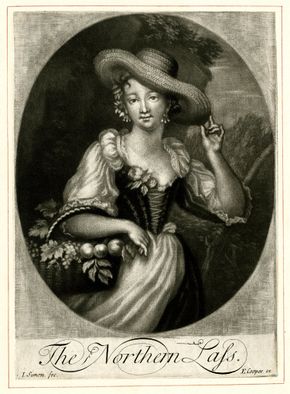Annotation:Northern Lass (1) (The)
NORTHERN LASS [1], THE. AKA and see "Muirland Willie," "Lord Frog and Lady Mouse." English, Country Dance Tune (6/8 time). G Minor (Playford): E Minor (Offord). Standard tuning (fiddle). AB. There are several 'Northern Lass' tunes. "Northern Lass (1)" is found in John Playford's Apollo's Banquet (1670, p. 124), The Pleasant Companion, or New Instructions for the Flageolet (1680), D'Urfey's Pills to Purge Melancholy, Walsh's New Country Dances for the year 1713 (1713) {where it appears as "Lord Frog"}, Wright's Country Dances {where it appears as "Muirland Willie"}, and The Merry Musician (1716). Chappell (1859) states it appears in several ballad operas, although in altered form. He explains:

The ballad is to be found in Roxburghe, ii. 161, and is there called "The Fickle Northern Lass, or the Wrong'd Shepherd's Resolution," &c. Tune of "There was a lass in the North Country." It begins:--
There was a lass in the North Country,
And she had lovers two or three
But she unkindly dealt by one
Who had to her great favour shewn.
Which made him this for to complain--
I never shall see my love again,
For since she had chang'd her mind,
I'll trust no more to womankind.
In Walsh's Country Dances, and in the ballad operas generally, the tune is called "Lord Frog", from a song written to it by D'Urfey, beginning, "Great Lord Frog to Lady Mouse," &c. (see "Pills, &c., 1719, vol. i., p. 14) and Silvia, p. 35); in Wright's Country Dances it is called "Muirland Willie." In Shield's opera The Farmer, it also appears, set to the song, "Look dear Madam, I'm quite the thing."
John Glen (Early Scottish Melodies, 1900) says Playford's version was arranged for the violin, "and seems to have been copied from some pipe-version of the air." He notes that the versions in ballad-operas differ considerably, as do the two versions contained in The Merry Musician, where one is a song by D'Urfey, while the other is from the ballad-opera Momus turn'd Fabulist. Glen is of the opinion that the Walsh, D'Urfey and other versions resemble the Scottish "Muirland Willie," but are much inferior.

